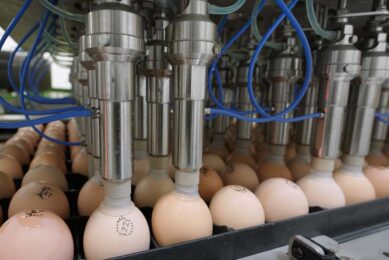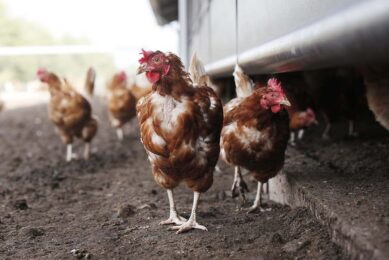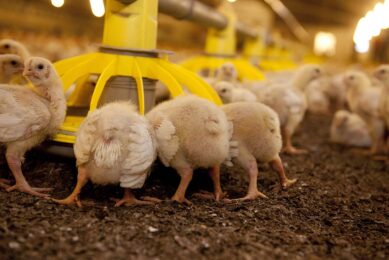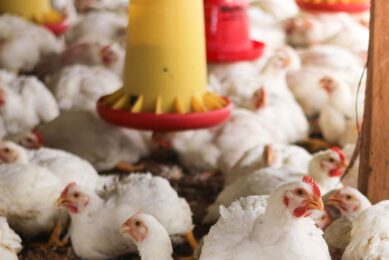Bacillus subtilis’ effect on ammonia emissions in broilers

New research from Chr.Hansen reveals that using a Bacillus based probiotic can help reduce ammonia emissions from broiler excreta. This not only helps to reduce the negative impact on the environment but also has health benefits for the birds and farm staff welfare.
Over the past decades, the poultry sector’s growth and trends toward intensification and concentration have given rise to environmental concerns. A direct consequence of these structural changes is increased production of waste, which could result in environmental implications. An increase in waste by-products may correspondingly become an issue. Both local neighbourhoods and the internal environment of production facilities can be affected. For example, an increase in ammonia levels can be detrimental for birds (conjunctivitis) and workers in the farm (respiratory issues).
Reducing gas emissions with Bacillus subtilis
The objective of this study was to evaluate the effect of a Bacillus based probiotic Bacillus subtilis DSM17299 – GalliPro (or GalliPro Max in some markets) on ammonia emissions (NH3) in broiler excreta. 3 different nutritional density formulations were compared (Figure 1). Each of them was compared with or without the use of GalliPro.
Figure 1 – NH3 gas emission (ppm) in excreta measured for 3 nutritional densities with or without GalliPro.

A total of 816, 1-day-old Ross 308 broiler chicks were selected in a 6-weeks feeding trial. Birds were randomly distributed to 1 of the 6 dietary treatments (8 replicate pens/treatment with 17 birds/replicate pen). A factorial experimental design was used with 3 levels of metabolisable energy (ME) and crude protein (CP): 100% ME and CP (T1+T2), 98.8% ME and CP (T3+T4), and 97.6% ME and CP (T5+T6) with constant amino acid levels (Table 1). Treatments 2, 4, and 6 were supplemented with 500 g/tonne (1 lb/ton equivalent) of a Bacillus subtilis-based probiotic (Bacillus subtilis DSM17299 – GalliPro), a target inclusion of 8×105 cfu/gram of feed. Experimental diets used were corn, wheat and soybean meal based.
- At the end of the trial, excreta samples were collected from each pen and stored in plastic boxes in duplicates.
- Fermentation took place for a period of 5 days at room temperature (25°C/77°F)
- Ammonia (NH3) emissions were measured with a Gastec (model GV-100) gas sampling pump (Gastec Corp., Kanagawa, Japan).
What can we expect?
A decreasing numerical trend (P=0.059) of NH3 gas emission from the excreta was observed for birds fed ME- and CP-reduced diets compared with control diets. Birds fed the Bacillus based probiotic supplemented diets showed significantly reduced NH3 emissions (P<0.05) compared to those fed diets without the probiotic.></0.05)>
Summary of results
Supplementation of the probiotic in broiler diets during a period of 6 weeks allows significant reduction of ammonia emissions (NH3) compared with non-supplemented diets, regardless of nutrient concentration. This effect can be explained by 2 major benefits:
- Protection of the top of the villi (GalliPro creates microcolonies in the gut) prolongs and protects this very important location for intestinal absorption
- By releasing enzymes locally, close to the brush broth, the probiotic improves the availability of indigestible nutrients like complex proteins and carbohydrates, thus improving the digestibility of these key elements of the feed.
Positive impact on the environment
The benefits of including the Bacillus subtilis from Chr. Hansen in broiler rations allow for reduced ammonia emissions (NH3) in their excreta. It is well known that Bacillus based probiotic has the ability to colonise the top of the intestinal villi with 2 major benefits to the bird’s intestine: protection of villi and releasing different substances.
These 2 mechanisms lead to better use of nutrients by birds. There is less non – digested waste excreted by bird. This results in double benefits: less nutrients are wasted (excreted), and less nutrients leftovers (like non digested protein) for the pathogenic bacteria growth are available. Reducing this waste not only makes an economic impact on animal production (more nutrients available for birds to grow), but also allows to reduce gas emission.
This can impact the environment, as well as birds and human (farm workers) welfare.
References are available on request
Author:
Jean-Christophe Bodin, Msc, Agr., Sr. Product Manager Poultry, Chr. Hansen
Join 31,000+ subscribers
Subscribe to our newsletter to stay updated about all the need-to-know content in the poultry sector, three times a week. Beheer
Beheer





 WP Admin
WP Admin  Bewerk bericht
Bewerk bericht